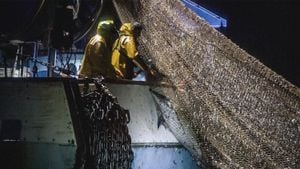The Philippines is grappling with a grave environmental situation following the tragic capsize of an oil tanker carrying approximately 1.4 million liters (around 370,000 gallons) of industrial fuel, an incident that has sparked urgent fears of a catastrophic oil spill affecting coastal waters. The MT Terra Nova sank just off the coast near Limay, Bataan province, during turbulent weather conditions tied to Typhoon Gaemi, which had previously wreaked havoc in the region, causing extensive flooding and loss of life.
This devastating event happened on July 25, 2024, in the early hours when adverse weather severely impacted shipping conditions across the area. While the 17 crew members aboard faced treacherous waves and strong winds, the vessel capsized and descended into the depths of the sea, tragically ending the life of one crew member while rescuers managed to save 16 others despite the hazardous environment. As reports indicate, one crew member's body was later recovered from the waters during the coast guard's rescue operations.
Authorities are now racing against time to address the oil spill, which has already spread roughly two nautical miles from its initial site due to strong ocean currents. Philippine Coast Guard (PCG) Rear Admiral Armando Balilo has emphasized that immediate action is crucial to contain the spill and prevent it from reaching Manila, which is home to one of the largest ports in the region and a crucial hub of economic activity.
The situation is exacerbated by Typhoon Gaemi, which indirectly affected the Philippines by enhancing seasonal monsoon rains that inundated vast areas of Metro Manila and surrounding provinces. Reports confirm that Typhoon Gaemi has led to at least 34 fatalities across the region, further stressing the resources of local authorities responding both to flooding and the accident.
As officials assess the full breadth of the disaster, they are concerned about the potential repercussions for local marine ecosystems and fishing livelihoods. Balilo remarked that the coast guard must be prepared for the worst possible scenario to mitigate widespread marine environmental impacts. The initial focus is on containing the spill, primarily believed to stem from the vessel's fuel tank rather than from the cargo itself. Fortunately, the main oil reservoirs on the MT Terra Nova appear to be intact, offering a window of opportunity to siphon the remaining oil before any potentially disastrous leaking occurs.
In light of previous oil spill disasters, such as the MT Princess Empress spill that impacted local ecosystems on a dramatic scale, the urgency to avert another ecological crisis is palpable. Local fisherfolk, heavily reliant on the marine environment for their sustenance and livelihood, are deeply concerned about the impending impact, as they have voiced alarm over the situation. Pando Hicap, representing a local fishing group, reaffirmed that the waters are essential for their daily lives without alternative sources of income.
Currently, the response plan includes the deployment of oil dispersants to mitigate the impact while the PCG collaborates with local government units and environmental experts to save marine resources. With floating barriers being set up in affected areas and special equipment being positioned, an operational timeline has been set for a seven-day period aimed at efficiently blocking further oil from dispersing into coastal waters.
The ship's sinking coincided with a broader pattern of increasing climate vulnerability, where typhoons in the region have intensified due to climate change, showcasing the necessity for stronger maritime regulations and environmental protections within the shipping industry. In addition to immediate recovery efforts, long-term discussions around maritime safety regulations in severe weather conditions are gaining traction, especially given the role of typhoons in the increasing frequency of such disasters.
As the storm system has made landfall in southeastern China, with coastal evacuations and further disruptions anticipated, the Philippine government remains vigilant. President Ferdinand Marcos Jr. is adamant about assessing damages and ensuring resources are mobilized promptly.
In conclusion, vibrant ecosystems and numerous livelihoods face significant peril as officials meticulously manage the unfolding crisis. The ongoing situation serves as a stark reminder of the interconnectedness between weather phenomena, environmental protections, and human activities. As the Philippines responds to this environmental challenge, the pressing need for resilient infrastructure and cleaner practices in maritime operations becomes exceedingly clear.



